
QUEENSRŸCHE – Vindication
Anthony Morgan
June 2013
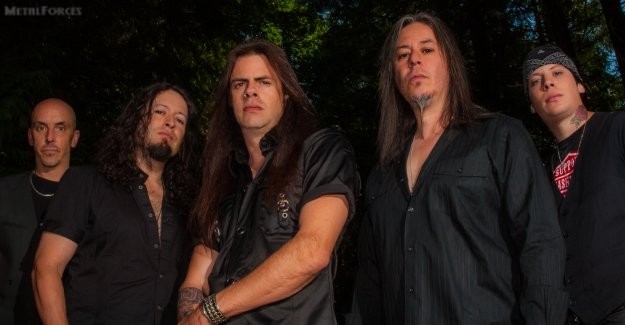 Queensrÿche (l-r): Scott Rockenfield, Michael Wilton, Todd La Torre, Eddie Jackson and Parker Lundgren |
![]()
Washington heavy metal outfit Queensrÿche underwent major upheaval during mid-2012. An April 12th group meeting was unattended by then vocalist Geoff Tate, a meeting which culminated in the firing of Tate’s stepdaughter Miranda, who oversaw Queensrÿche’s fan club. That same meeting additionally resulted in the firing of manager Susan, Tate’s wife. Two days later prior to soundcheck at a São Paulo, Brazil concert date, Tate argued with his fellow Queensrÿche members in relation to the firings. This allegedly culminated in a physical altercation, a conference call subsequently occurring in early June. Tate withdrew from the conference call, the remaining members voting unanimously to dismiss the frontman. To summarise, musical differences, personal differences, and financial issues could arguably be cited as reasons behind the split.
“It’s all three of those, and if not, then even more things,” admits Scott Rockenfield, drummer and co-founder of Queensrÿche. “There’s a lot of stuff that goes into any type of break-up, I suppose. This one, since we’re in a musical situation a lot of it is creative. We weren’t seeing eye-to-eye musically, as they say. Michael (Wilton, guitars), Eddie (Jackson, bass), and I have been trying for years to play a lot of the old Queensrÿche material in our live show, and Geoff just wouldn’t have it. He wasn’t interested in doing it – he didn’t want to do it, etcetera, etcetera. That has been an ongoing struggle for a while, but also making new music was a struggle for many years. I think the calibre of what Queensrÿche music should be, we weren’t agreeing on that as well. Michael, Eddie, and I once again had an idea of what we wanted to be doing musically as Queensrÿche, and Geoff just really wasn’t interested in that type of direction. We just had to make a final decision based a lot of those things. A lot of it was financial, where we wanted to make some financial decisions.”
The ensemble’s June 2013 full-length aside, the sticksman is dismissive of Queensrÿche’s more recent studio offerings. “To be honest, we weren’t all mentally a part of a lot of that stuff,” he confesses. “It was a struggle. We’ve been writing music and submitting it as what we felt we should be doing, but Geoff didn’t like the style or wasn’t interested. His solution was that he was going to only sing on music that he wanted to work on, and that became music by other people. I think our records have suffered greatly because of that, and that’s what we really want to get back to. This new record is only written by us five; it’s Michael, Eddie, me, Todd (La Torre, vocals), and Parker (Lundgren, guitars). We sat and wrote the entire record together, and I think that the strength of the record is that sound. It sounds like we worked on it together – it sounds like a band. That’s been a goal of ours for a long time, and I think now is just the time for us to do that.”
New Queensrÿche vocalist Todd La Torre initially met axeman Michael Wilton during January 2012’s NAMM Show in Anaheim, California. “We had a private artist dinner party, and we just started talking about some side music for some TV – things like that,” he remembers. “We just kind of hit it off really well, and had a good rapport. That just kind of evolved into songwriting and collaborating, just the two of us. When that chemistry then became evident very quickly, I think he felt it would be in his interest to introduce that music and idea to the rest of his band. It just kind of evolved from there. That was my initial introduction to all of the guys in Queensrÿche.”
“To kind of elaborate a little bit more on Todd’s introduction about how he met Michael and how he got introduced to each of us in the band, we were at a point back in the spring of 2012 where Michael, Eddie, and I didn’t really have anything to do,” Scott augments. “Geoff was focusing on going out and doing a bunch of solo touring to support a record that he put out (Kings & Thieves, November 2012), and we wanted to keep doing something. Michael had met Todd, and suggested that him, Eddie, and I should maybe go out and just put together a really great setlist of songs, the majority of which were old Queensrÿche material. Michael suggested that we come up with a different band, and just go out, have some fun, and play some shows. That’s actually what we did in June 2012. We rehearsed for a couple of weeks, and we put together a show. We called the band at the time Rising West.
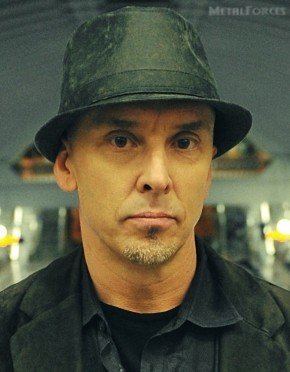
|
“We did these shows in June 2012 in Seattle, and they were really just to have fun. They were so we could play some of the old Queensrÿche material that we hadn’t been able to play for a long time. Todd came into the band, and he was a great fit for being able to represent our catalogue from the past. We did those two shows, and they were very successful. They really showed us that we could have a lot of fun together, and that we had a great chemistry. Well, the interesting thing about that time was that was exactly at the same time that Geoff had decided that he wasn’t being involved with Queensrÿche any more. Michael, Eddie, and I wanted to move on with Queensrÿche, so we went through a transition from Geoff.
“Right at that time we had already known Todd, and we knew that we could work together. We just brought him into the whole thing. He was interested in doing it and we wanted to keep going as Queensrÿche, and so we did. That’s what we’ve been doing ever since basically June 2012. We’ve been playing shows around the world as Queensrÿche with Todd in the band, and then we’ve made a new record. That’s kind of where we’re at. I think that sums up everything really about what we’ve gone through, and why we’re at where we’re at right now.”
Although this respective incarnation was initially dubbed Rising West, the aforementioned June 2013 platter was never slated for issue under the Rising West moniker. “This was always going to be a Queensrÿche record, because we started making this after we had made the decision to move on from our relationship with Geoff,” the rhythmist clarifies. “At that same time, like I said, once we realised that Todd could come into what we wanted to do and that we could continue as Queensrÿche, our next goal right after that was we really wanted to make a record together and have some fun doing that. We already knew that we would have a really good chemistry of writing songs together, so we started doing that later in the summer of 2012. We just continued. We’ve got a new management company that’s really supportive, and we just knew that we wanted to do that. This was basically always going to be a Queensrÿche record, yes.”
‘A Queensrÿche record’ is a description which Geoff Tate would apply to Frequency Unknown. Surfacing via Deadline Music in April 2013, the effort additionally bears the Queensrÿche name. The relevant personnel consist of Tate, not to mention a raft of guest musicians. “There are obviously little bits here and there that are out there, but I haven’t spent any time focusing on it,” Scott shares. “In all honesty, whatever is going on for us in our Queensrÿche and what we’re doing is busy times, and it’s fun busy times. Making the record was a lot of work though, and it was a lot of time that we put into it to make it the best that we could. We’re playing shows around the world, we’re travelling a lot, and we’re doing interviews constantly. That energy requires a lot of focus, and we just kind of try to keep focused on that. What’s so great about what we’ve done, and the confidence that we’ve put into the music that we’ve made is…
“I think the proof is always gonna be with the fans, but so far the fan support for our live shows over the past year has been overwhelming. All around the world they’ve been supporting, and they’re glad that we’re back and having fun and doing what we feel we should be doing. The fans are enjoying that, but they’ve also enjoyed the anticipation. Their anticipation for our record was really high, and I think that’s always gonna be the proof in the pudding. We can’t really complain. It just is what it is, but I don’t really follow all of that other stuff that’s going on.”
At the time of writing, the ownership of Queensrÿche’s name is at the centre of a legal dispute, a dispute dating back to June 12th, 2012. “There hasn’t been a decision yet on the ownership of the name. About eight months ago in the battle for who gets the name – whether it’s Geoff or it’s Michael, Eddie, and I, because we’re the four owners of the corporation – it became this Washington state law thing where somebody gets the name, because there can’t be two,” the percussionist explains. “I doubt if there’ll ever be two, but the judge let it ride with two until November when she will actually make a final decision. That’s where we’re at.
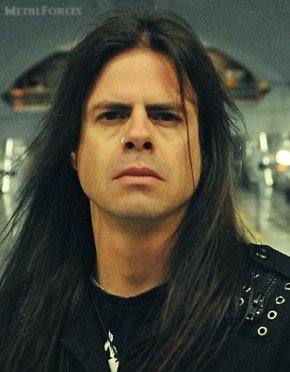
|
“In the next four or five months or so – if it goes that far – is when a judge will make a final decision. But listen. At this point in time, our confidence about what we’re doing as us being Queensrÿche is pretty high. Michael, Eddie, and I have co-owned the name Queensrÿche – as three out of four co-owners of the name – as long as anybody else. We’ve absolutely been in the band even longer than Geoff has been in the band, so we have the absolute right to carry on as Queensrÿche. We’re be able to go out and perform the material live like it’s supposed to be played.
“I think now with Todd in the band, we’re also proving that we have a relationship together of making new music, music that once again supports what we feel Queensrÿche should sound like – what style of music, and what style of songs Queensrÿche should be making. We feel great about that. So yeah, it’s kind of a weird thing a little bit. There’s another Queensrÿche that’s out there, and it kind of confuses people. To be honest, we don’t even really know that there’s another one, because we don’t care about it. We don’t think it’s a very good representation of what Queensrÿche should be. We feel that we better represent what the band is about in terms of our live music that we can play correctly, and in terms of making records that our fans want to hear.
“We’re just trying our best to just focus on what makes us strong, which is playing shows, making music, and supporting the record. I think that the proof will always be in the result, and I think that our result is pretty high right now.”
Queensrÿche’s highs and lows throughout the years could potentially be the subject of an engaging autobiography. “Anything’s possible,” Scott muses. “I’ve actually started working on ideas through the years, of writing a book – I guess my own memoirs of everything that’s gone on. Listen, at some point I would feel that there’s a story to be told. It’s an interesting situation that we’ve gone through. We had a great 30-year career, and then we went through this major transition, and a sticky legal thing. However Geoff has been dealing with it has also been a bunch of drama, and interesting things. It could make for a fun read (laughs).”
A potential co-writer has been considered, but no firm decision has been made. “I haven’t gotten that far yet,” the drummer informs. “It’s mostly just jotting down ideas, and keeping journals. It’s kind of a stream of thought, but I’ve done quite a bit of it. I have a friend of mine who’s actually a pretty well-known journalist here in the United States, and we’ve been friends for a long time. He’s interested in helping me when the time comes, so that could be a fun way to get things rolling.”
Queensrÿche’s early compositions were used as a musical barometer. “I surely didn’t want the band to sound adult contemporary,” Todd notes. “In my opinion, I wanted the music to have all of the elements that everyone knew Queensrÿche to have. I wanted to bring back a heavier sound vocally, and I wanted to hear the guitars crunching a little more. Obviously Scott is an amazing drummer, and I wanted Scott to really feel a part of everything that we were doing. The drumming on this record is… This is the great Scott Rockenfield playing drums again, and you can hear it.
“What I wanted to bring to the table and to this record is just an open mind. I wanted to be a team player that’s willing to listen to any and all of their creative ideas, but also be treated and respected as an equal, and be able to share my musical thoughts and ideas. I don’t mean just as a vocalist, but with different instruments as well. If I have an idea, they’ve all been extremely receptive. Everyone was equal in every aspect of making this record. I wanted to bring back a heavier sound, but I didn’t want it to be a heavy metal record. I wanted it to have heavy elements, but I wanted it to have emotion and melody, and be something that was timeless. I wanted the songs to be timeless, songs that are gonna hold up and stand the test of time.”
“If I can just interject really quick, because I think it’s important what Todd is saying,” Scott emphasizes. “If you wrap it all up, once we started making music, we kind of found what we used to be good at together. We wanted to revisit what made Queensrÿche so special, and why the chemistry worked so well. A lot of that was in our earlier records. With our live show, we’ve only been playing music from our first EP (Queensrÿche, September 1983) up through Empire (August 1990) so to speak. I think that was kind of a great era for Queensrÿche, that first ten years of us being together and making records. There was a chemistry that worked, and I think that focus is kind of what we wanted to do on this with Todd. The great thing about bringing Todd into it was we could focus on the energies of Queensrÿche.
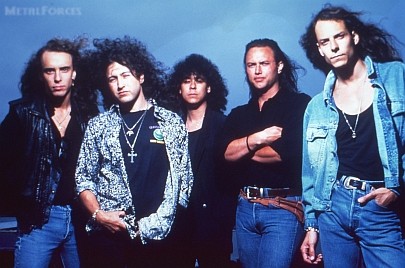
|
“There’s some great progressive and rock, and there’s metal, but they’re all done still by focusing on every one of them being a good song. With the amount of styles on this new record, we’ve got orchestrated music, we’ve got uptempo, more aggressive songs on the record, and stuff like that. Every one of them still has a hook and a song though, and a focus. I think that was important to Queensrÿche in the past, and I think we’ve captured that again in the future. Now I think we’ve done it with a great, new, modern flair however, so it still sounds like Queensrÿche but we’ve done it with our own new style. Todd definitely has his own style to what he does as well.”
As to which past Queensrÿche full-length the June 2013 platter shares the most traits with, the rhythmist is ambivalent. “Wow,” he responds. “Personally… Todd can answer this afterwards and give his opinion on it, because we might all have different ones. Again, I kind of think this one is kind of a culmination of a lot of things in Queensrÿche. I think there are elements of our first EP and I think there are elements of The Warning (September 1984), and then I think there are elements of Rage For Order (July 1986), Operation: Mindcrime (May 1988), Empire, and Promised Land (October 1994). Listen, those are our first six records that I just listed out I think, but to me that was the important focus. That’s what I was focusing on when we were writing the songs, and when I was doing my performances, and recording the drums, and everything else that I did.
“I think we captured a lot of that early, first 10-15 years of the Queensrÿche sound and the Queensrÿche energy. I don’t think it sounds like any one in particular, and it’s interesting. As we’re doing more and more interviews, we’re certainly getting great feedback. Some guys are like ‘I think this sounds like Rage For Order, Version Two,’ and that’s so awesome. Others are like ‘I think this sounds like The Warning meets Empire,’ or ‘This sounds like the record that would’ve come after Promised Land’ or something, so it’s a great combination of feedback we’re getting. So yeah, it’s hard for me to just pinpoint one exact thing. I think it sounds like a great body of work though, and is absolutely the sound of Queensrÿche.”
Todd is equally inconclusive. “I can’t say this album is closer to any one in particular,” he concurs. “Just to reiterate what Scott said though, I think that there are songs on this album that are reminiscent and have that energy and vibe. Some are like ‘This sounds like it could’ve been on Mindcrime,’ or ‘This sounds like it could’ve been written during the Empire days,’ and so forth – from the EP up to Empire, or Promised Land. I think there are elements that are very reminiscent of those albums, but there are also one or two songs let’s say that I don’t think sound like they would’ve been on any of those albums. For example, to me the song ‘In This Light’ doesn’t sound like it would’ve been on any of those. I think each song can stand on its own merits, but there are certain elements that I believe are reminiscent of the first five or six records.”
The frontman’s vocals do not attempt to merely replicate those of his predecessor. “I’m sure that there are some vocal phrasings that I do that aren’t something which Geoff may have done,” he observes. “The only thing that I could maybe say is that sometimes I have a little bit of a rasp in my voice, and Geoff never appeared to have any type of rasp or grittiness to his voice. That’s probably a texture that I implemented vocally that he didn’t do, certainly. I think I’m showing a high and low range, but in particular a high range that hasn’t been present in some years from Geoff’s vocal performances. Not to say that he couldn’t do it, but I wasn’t hearing that. I wanted to try to bring back some of the… Geoff was always known for having an amazing range, and so I wanted to be able to show some vocal acrobatics but not overdone. I didn’t wanna sing everything so high, because I think it’s overrated. I kind of like to have the high notes here and there as a cherry on top. Sometimes if you just do everything that you can do in every song, it just loses its cool factor.”
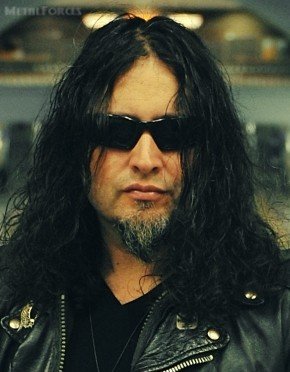
|
“Once again, it’s all about what’s right for the song,” Scott stresses. “I think Todd did that very well by being himself. I think we still sound like Queensrÿche, but he’s able to do it by being himself and focusing on… All of us did for that matter, but in terms of what any song needs we each try to do to our best. That’s so that the song just develops, and becomes the best that it can be without being overdone or anything. I think focusing on a good song is not an easy task, but I think we’ve done it. I think we feel really good about what we’ve done. Todd’s really great about knowing what to do with his voice and how to deliver for any given song, so the chemistry has just been really great.”
Cutting the opus, Todd experienced a warm reception. “When Todd came into the band, our whole arrangement together was that we were all in this together,” the percussionist discerns. “We’re all a part of this. We’re gonna go out, we’re gonna be Queensrÿche, and we’re gonna talk about it like its Queensrÿche. There’s not really any other way to look at it. We’re gonna be a team together, and if we don’t look at it that way then it’s really not important to the rest of us either, because we’re not interested in being… Kind of like a football team. You all mean something and you all have to go out with the same goal in mind, which is doing your job. You have to work as a team though, and that’s one thing about Queensrÿche. We can even talk a little bit about… Hey, listen. Queensrÿche is never about one guy, and that’s why for any one person to go out right now and call themselves Queensrÿche to us is a little bit ridiculous.
“Queensrÿche has always been about the team, and the chemistry together. Once again, that’s why Michael, Eddie, and I feel like we have the most right to go out and do it, because we’re the majority of what the band was from the beginning anyways. Now with Todd though – and listen, even Parker in the band – everything is equal. We’re working together hard, we’re enjoying the time together, and we’re all open to discussion. We haven’t had that energy for a long time, and we’re just really happy that we’re back to that again. I think it proves itself, and I think it shows in the new record that we have that energy together.”
“Also really quick, if I can add to what Scott said…,” Todd replies. “If they were to say ‘You’re just a singer. Do it this way’… I was granted complete creative freedom. Nobody told me ‘Sing it this way’, ‘You have to sound like Geoff’, or ‘Do this’ or ‘Do that’. That would have limited my creativity. When everybody feels that they are equal, then you’re going to get so much more output from each member. If I went in with that feeling that they’re just gonna tell me what to do and how to do it, and that they’re gonna tell me what words to say, and not to do this, and not to do that…
“I think even subconsciously, it surely would have affected the level of love that I would have put into the album. As it was not like that, obviously my heart and soul in even the things that I didn’t do – the guitar parts that those guys wrote, the bass lines that Eddie wrote. I can love those things that I didn’t even create personally, because we’re all in this together. Just like Scott said, when it’s not a team thing, that’s when resentment starts to happen. That’s when there’s animosity, and that’s reflected in every aspect of performing, writing, and hanging out as friends. It’s very important that everyone is respected and treated equally, for sure.”
Related Posts via Categories
- QUEENSRŸCHE – Digital Noise Alliance (2022) | Album / EP Reviews @ Metal Forces Magazine
- QUEENSRŸCHE – Vindication, Part Two (June 2013) | Features / Interviews @ Metal Forces Magazine
- QUEENSRŸCHE – Queensrÿche (2013) | Album / EP Reviews @ Metal Forces Magazine
- QUEENSRŸCHE – Operation: Mindcrime (1988) | Album / EP Reviews @ Metal Forces Magazine
|
|





